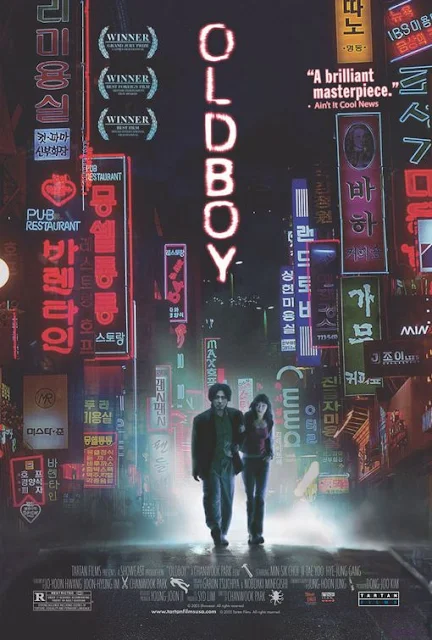 |
| Old Boy Poster |
Korean cinema has seen a meteoric rise in global popularity, and among its greatest triumphs stands Oldboy (2003) — a film that not only shocked audiences but also challenged the very notion of revenge in storytelling. Directed by Park Chan-wook, Oldboy is much more than just a thriller. It’s a twisted psychological journey that peels back layers of human suffering, guilt, and identity.
“Laugh, and the world laughs with you. Weep, and you weep alone.”
– One of the most chilling lines in cinema history.
🔒 The Power of Isolation and Time
Watching Oldboy for the first time is a rollercoaster of surprise and confusion. Watching it again? It’s a lesson in emotional complexity. You begin to notice how deeply the theme of time is embedded into the protagonist’s identity.
Oh Dae-su, imprisoned for 15 years without knowing why, emerges into a world that has moved on without him. Each scene becomes more than plot — it becomes a metaphor for memory and trauma.
🛠️ The Iconic Hallway Scene: Brutal Yet Poetic
Unfortunately, the illustration for this scene couldn't be generated due to image issues. But if you’ve seen it, you remember it: a single-take fight where Dae-su battles a corridor full of attackers, armed only with a hammer. No CGI. No flashy choreography. Just raw, human struggle.
This moment epitomizes what makes Oldboy a masterpiece — violence not for spectacle, but as a reflection of psychological desperation.
💔 The Twist That Hurts More the Second Time
The final revelation is one of the most disturbing twists in cinematic history. But what's even more haunting is watching it knowing the truth ahead of time. The breadcrumbs are everywhere: the puppet strings of manipulation, the eerie calm of Lee Woo-jin, and the naivety of Mi-do.
This rewatch reveals Oldboy not as a mystery, but as a tragedy with inescapable fate. The clues were always there. We just didn’t want to believe them.
🎬 Park Chan-wook’s Visual Language
Park Chan-wook uses the camera like a scalpel — cutting through layers of emotion. His use of color, symmetry, and silence speaks volumes. Especially upon rewatching, you start to notice:
-
The recurring use of mirrors and reflections to emphasize identity confusion
-
Close-ups that capture subtle, human pain rather than just dramatic emotion
-
Stillness, which amplifies tension more than action ever could
🌐 A Global Legacy
Oldboy’s critical acclaim wasn't just local. It won the Grand Prix at the 2004 Cannes Film Festival, handpicked by Quentin Tarantino himself. A U.S. remake attempted to recapture its essence but fell short — further proving how irreplaceable the original is.
🧠 Why You Should Rewatch It Today
Watching Oldboy a second (or third) time is like peeling back the skin of your own memories. It reminds us that:
-
Truth isn't always liberating
-
Forgiveness is harder than revenge
-
And sometimes, we’re all prisoners of our past
This film ages like a haunting melody — the more you listen, the more it echoes.
📌 Final Thoughts
If you’re into films that challenge, provoke, and linger in your mind long after the credits roll, Oldboy is a must-revisit. It's not just a movie — it's an experience, one that leaves you questioning your own morality and empathy.
